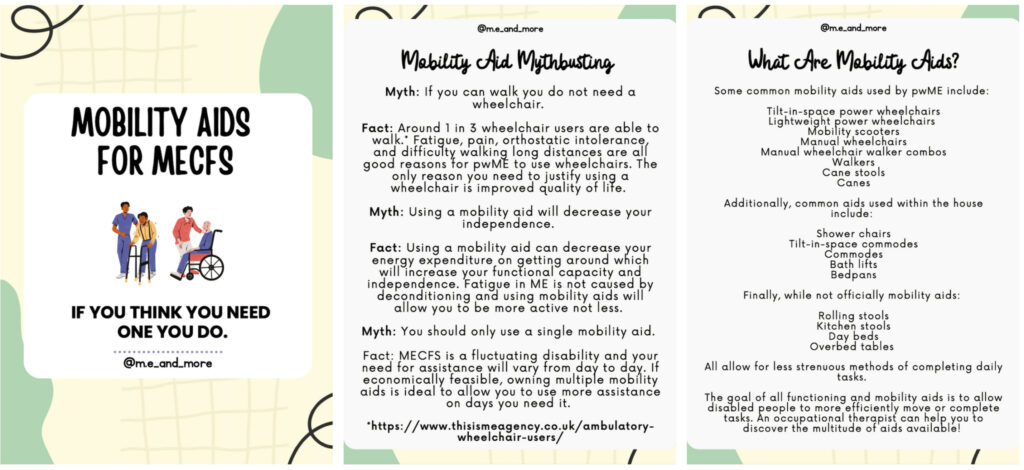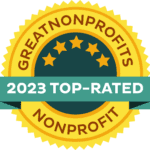
As part of this year’s Triple Giving November campaign, we are honored to introduce Sammy Lincroft, a dedicated advocate for chronic illnesses.
Sammy is a strong supporter of Open Medicine Foundation in alignment with her advocacy for ME/CFS and disability justice. She runs a blog, www.meandmore.net, and an Instagram account, @m.e_and_more, where she provides valuable resources for people with ME/CFS and complex chronic illnesses.

Recently, Sammy chatted with us about her social media advocacy, life with ME/CFS, and more:
How long have you been living with ME/CFS?
I have been living with Myalgic Encephalomyelitis/Chronic Fatigue Syndrome (ME/CFS) for five years. I have been bed-bound since the beginning of 2021. In September of 2018, ME/CFS hit me like a bus with sudden severe chronic fatigue. No matter how much I rested, I felt exhausted, muscle aching, head throbbing, as though I had the flu that would never end. The most devastating symptom was the cognitive dysfunction that stole my identity and left me feeling as though my brain had simply ceased to function.
I was diagnosed with depression and anxiety, but I couldn’t understand how that could explain my fatigue, chronic pain, and periodic paralysis. I wish I had known that the mental health struggle I was experiencing was chronic illness grief, a natural response to losing my health overnight.
Over the next two years, I tried to follow the doctor’s instructions to “get back out there” and gradually increase my activity, but this only caused more pain and disability. I was at first “mild” and able to study and work with great difficulty. However, trying to be a “good patient” left me housebound and in a wheelchair.
After two years and a diagnosis of fibromyalgia and Behcet’s Disease, I discovered ME/CFS myself and underwent a two-day cardiopulmonary exercise test or CPET seeking a diagnosis. The test involved biking for 15 minutes on two consecutive days. Not only did the test reveal the extent of my energy deficiencies, but it also showed almost a 20% reduction in capacity on the second day – something not even heart failure patients experience. The test didn’t even begin to capture the Post-Exertional Malaise or “crash” I experienced. Light and noise became daggers of toxic pain. I could not stand without blacking out.
That was early 2021. It is now almost three years later, and I remain bedbound, plagued by constant migraine, severe pain, and cluster headaches. So much of my suffering could have been prevented if only my doctors had recognized the signs of ME. Had they not dismissed my paralysis, extreme fatigue, and crashes as anxiety and depression.
What was life like prior to chronic illness?
If I could describe my personality in one word, it would be passionate. Prior to ME/CFS, my friends described me as living multiple lives worth of activity. I was a musician, performing on Carillons (bell towers) across the eastern seaboard and singing choral music with groups like the San Francisco Symphony and London Philharmonia in 8 countries and over 20 languages.
I started coding at the age of 10, was teaching and mentoring software engineering at the age of 16, and interned at Google on the Data Anonymization and Privacy team. I was sailing through my degree in computer science at Wellesley College as well as studying advanced mathematics, and I was on track for a dual degree in engineering at MIT when I got sick.
Physically, I enjoyed swimming, dancing, and skiing. Just a year before my illness, I completed an incredible 7-day ski tour of New Zealand with my dad.
What does daily life look like for you now?
My daily life now is one of complete dependence. I am bed-bound 24/7 and dependent on care to eat, toilet, and clean myself. My room is disconnected from the outside world by air purifiers, climate control, and noise and light canceling panels, all of which are necessary to avoid severe pain and symptoms. As though in a space station, I live in isolation, watching the world below pass by without me.
In order to control my symptoms, I require IV fluids five days or more a week, given through a surgically implanted port in my chest. I take around 30 pills broken up three times a day to manage symptoms such as migraines, muscle spasms, hives, shortness of breath, tachycardia, nerve pain, nausea, etc.
I sleep around 16 hours a day when I do not suffer from “painsomnia” or adrenaline surges, which can leave me feeling over-caffeinated and shakingly exhausted all at once. Managing my health is a full-time job, not just for me but also for my caregiving team, which consists of my husband, father, and best friend.
When I have the energy, I spend it on writing the educational content I wish I had seen early in my illness. I write about the physical, mental, and political challenges of life with ME/CFS and severe ME/CFS in the hopes that I can help people better understand our illness. I believe that with better education, many people with ME/CFS can learn to manage their illness before it becomes severe, and providing that education gives my life hope and meaning.
What gives you the most hope on your bad days?
What helps me get through my days is the severe ME/CFS community. Despite my struggles, I see so many other patients who suffer everything I do without the support network I have. While I feel cursed by my illness, I feel incredibly privileged and blessed to have a loving family who understands and respects my limitations and does everything in their power to provide me with care.
The ME/CFS community, by necessity, rejects the idea that our value is our productivity. We value each other because we are human beings deserving of love and respect.
ME/CFS can make you feel powerless because so much of our power lies in our ability to act. But ME/CFS has also provided me with insight and wisdom, something I see time and time again throughout our community.
What is one thing you wish every person would understand about chronic, complex diseases such as ME/CFS?
No one chooses to live with ME/CFS. In the hundreds of patients I have spoken with, I have yet to meet one who simply accepted their illness. But we accept our lives because we must survive.
What you see of complex chronic illness is only the tip of the iceberg. You do not see us on our bad days. You do not see those of us who are marginalized. You do not see those who are too sick, too busy surviving, to make their voices heard. I urge you to consider all of the stories you are not reading and that you may never read.
Why do you support Open Medicine Foundation?
While our struggles are all different and our obstacles as diverse as the human experience, everyone with ME/CFS ultimately wants the same thing: we want our lives back. We want to see this devastating illness stop ruining lives. We want researchers who see our humanity and fight to preserve it.
Open Medicine Foundation understands the complexity and magnitude of research needed to diagnose and cure this disease. They understand how far behind and neglected research in this field is, and they fight for it anyway. They understand the importance of studying the most severe patients and making studies accessible to the most affected.
Open Medicine Foundation doesn’t promise false hope of an easy cure; they give us real hope of understanding and someday treating this illness. Millions of people with ME/CFS and complex chronic illnesses, myself included, cling to this hope.
Open Medicine Foundation (OMF) stands unwaveringly with Sammy and many others, ensuring that their stories drive our commitment to finding scientific answers. Our Triple Giving November campaign is about more than raising funds – it’s about championing a future where chronic illnesses no longer stop vibrant lives. Until November 30, 2023, EVERY dollar you give to OMF will be TRIPLED, up to $500,000.


